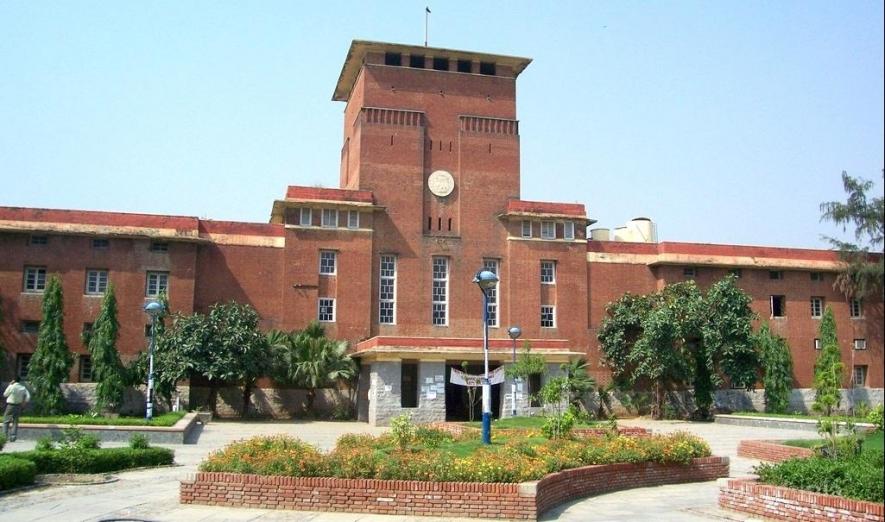DU: There’ll be no Judges From Marginalised Sections if Fee is so High, Warn Teachers, Students

New Delhi: Delhi University, one of the most prestigious central universities in the country, has witnessed consistent protests over the self-financing of its courses. The latest five-year BA LLB integrated course has also received criticism from all quarters. As per the official note, the admissions to the course would be made through the Common Law Admissions Test (CLAT).
The course fee has been fixed at Rs 1.90 lakh/annum. Students from economically weaker sections and disadvantaged groups can avail of 90% and 50% waivers, respectively. The family income for these waivers is Rs 4 lakh/annum and Rs 8 lakh/annum, respectively.
However, due to high fees, students remain sceptical about the programme's success. Teachers further highlight that expensive law education will deprive the Indian Judicial System of lawyers and judges from marginalised communities.
Aman Rawat, pursuing an LLB from Campus Law Centre, told NewsClick that students prefer a five-year course because they save one year with this format.
"LLB usually takes six years because a student graduates twice to be a lawyer. The course is taught with other subjects per your stream. i.e., humanities, commerce and sciences. The main component of the courses will remain the same. The faculty would be the same. Then, why this super-inflated fee?"
He added, "The decision to have admissions through CLAT is also objectionable because the fee for the application form for this particular test is Rs 4000. There is no guarantee that a student will succeed in getting admission. Thus, they are eliminating the prospects of common students applying for the course at the beginning. Why did they not allow admissions through the Common University Entrance Test (CUET), which is comparatively cheaper?"
Abhigyan Gandhi, Secretary of All India Students Association, told NewsClick that the administration is throwing fancy words like financial autonomy and self-financing courses. In contrast, it is drifting away from the promise of public education backed by government funding.
"What's the use of a public university when you are paying fees of private universities? You are forgetting the people to whom public universities are dedicated. Through these courses, the administration is decimating the Constitution and the people."
Gandhi added that the programme was launched without preparations.
"We do not know if physical classes will take place in the Science block or elsewhere. The administration did the same thing when CUET and the Four-Year Undergraduate Programme were implemented. They took admissions despite there not being a complete syllabus."
Echoing similar concerns, Mayank Kumar, Secretary of the Student Federation of India (SFI), told NewsClick that this programme is in the ambit of the government's long-term plan of privatising public education.
"With NEP (New Education Policy) 2020, the government aims to privatise and commercialise education. The introduction of the five-year LLB course and its absurdly high fees are the starting moves of the government to execute the anti-student NEP."
A teacher involved in designing the five-year integrated BA LLB course who requested anonymity said that the law courses for undergraduate students are designed in consonance with the syllabus, generally divided into optional and mandatory subjects prescribed by the Bar Council of India.
"We generally teach normal subjects in the first two years, and law is taught in the third year."
When asked about the high fees and their consequences, the teacher said, "There would be wider consequences. To begin with, when I was studying at National Law University, we were charged Rs 60,000/annum. Today, the average fee of the National Law Universities is around Rs 2 lakh/annum. A similar fee structure has been introduced at Delhi University."
There is an argument for providing relief to SC, ST, economically weaker sections or OBC non-creamy layer students. Still, a large population does not belong to these sections.
"Private Universities are too expensive. So, a normal middle-class family cannot anyway afford this structure. It's like opening a private university within a public university."
The teacher added that some students enrolled in current LLB courses often complain that arranging Rs 60,000/annum fees is difficult.
"If the fee is this high, students and their parents tend to take education loans. Once the programme ends, the pressure would be to repay the loans. So, some students would have wanted to pursue social justice litigation to study the legal struggle for the rights of dalits, tribals, minorities or the LGBTQ community. With these high fees, they may not do it in the first place. Female students who could fight with their families to study law because of low fees will no longer be able to do so."
Responding to the question of privatisation of education and new universities, the teacher added that the corporate houses funding the universities have their ideas, and in such cases, academic freedoms are being curtailed.
"Any university will flourish as long as it has academic freedom. In private universities, when students pay lakhs of rupees, they are often treated as customers. Teachers are viewed as mere service providers who cannot express their freedom. Students have to be necessarily promoted because it yields them money. In a public university, I can defend my academic freedom through court. This option is not available in private universities."
On the question of how the high fees will limit the number of future lawyers from marginalised and minority communities, the teacher said, "It would be disastrous if no lawyer, hence judges, comes up from marginalised communities. It is often reported that the judges in the higher judiciary of the country come from only 100 families. Mind you that the lawyers from marginalised communities made the judiciary realise that laws must framed on experiences too."
The teacher added, "If I were to argue, I would say that women lawyers brought forth the fact that the Hindu Succession Act is a very patriarchal law where the property of a childless widow would go to in-laws, whereas the case for a husband losing her wife would be a different scenario. Similarly, the lawyers from marginalised groups made the judiciary realise that reservation was not discriminatory just because it gave some castes assurance of affirmative action to get jobs and education. Similarly, lawyers from the LGBT community apprised the judiciary about social stigmas and got homosexual relationships decriminalised. They made the Indian judicial system more inclusive. It would not happen in future if fee hike is not arrested."
Ashok Agarwal, a senior lawyer who played an important role in implementing the Right to Education Act, told NewsClick that he had expressed his discontent over introducing a new five-year integrated law course.
Agarwal, a member of the Executive Council at Delhi University, said, "I cited the example of drop-out rates in Delhi government schools because parents cannot pay Rs 20/month. Here, the university is asking for lakhs of rupees. We have seen several examples where children who could pass the entrance tests dropped out because they could not pay the fee."
He added that the university is talking about education loans, but which bank would give them to poor construction workers?
Agarwal added that the administrators must understand that education and health are public assets and must be provided at cheap rates.
"What's the meaning of the Constitution if lawyers and judges from poor backgrounds are not showing up?"
Get the latest reports & analysis with people's perspective on Protests, movements & deep analytical videos, discussions of the current affairs in your Telegram app. Subscribe to NewsClick's Telegram channel & get Real-Time updates on stories, as they get published on our website.
























